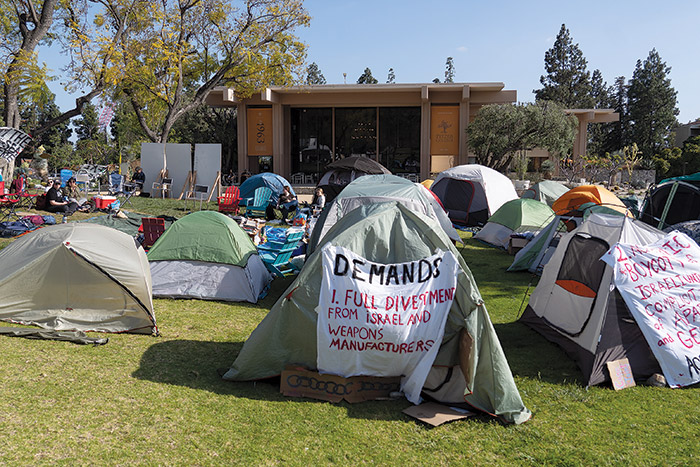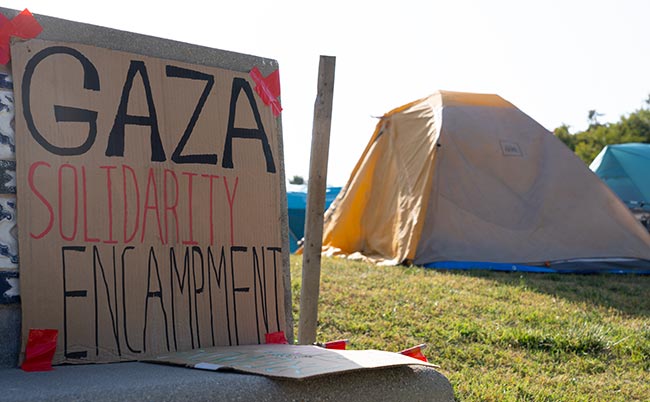Inside the Pitzer College encampment

A pro-Palestinian encampment located on the Pitzer College Mounds, pictured April 27. Courier photo/Andrew Alonzo
By Andrew Alonzo | aalonzo@claremont-courier.com
At about 5 a.m. on April 26, tents began being staked into the ground on the south end of the Pitzer College Mounds, laying the foundation of what would be, as one cardboard sign in the area reads, a “Gaza Solidarity Encampment.”
The encampment, created by two student demonstration groups, Claremont Students for Justice in Palestine and Jewish Voice for Peace at the Claremont Colleges, includes more than a dozen tents and occupants. It follows a nationwide trend of pro-Palestinian encampments erected on college campuses.
On Monday, the groups invited the public to the encampment to speak with demonstrators. Pitzer senior Bella Jacobs, 22, and Pitzer freshman Ezra Levinson, 19, explained the main goal of the encampment was to show solidarity with Palestinians in Gaza, and with other student demonstrators across the country. Jacobs said it also shows support for Palestinian liberation.
Demands from the Pitzer encampment echo those from recent demonstrations. On April 27 students and alumni demanded Pitzer and other Claremont Colleges divest from and disclose business dealings with companies aiding Israel’s offensive in Gaza. Other demands include calls for Pitzer to adhere to an academic boycott of Israeli institutions via resolution 60-R-5, which Pitzer President Strom C. Thacker said on April 11 he would veto; for Pitzer to revisit its protest policy and support student’s right to demonstrate; and to drop disciplinary sanctions against the five Pitzer students who were arrested and charged with trespassing after occupying Alexander Hall on April 5.
The students said on Monday they had reached out to Pitzer’s Board of Trustees and Thacker asking for a dialogue, but neither had responded. Wendy Shattuck, assistant vice president of communications at Pitzer College, contested those claims in an email to the Courier late Wednesday: “Pitzer’s administration did respond to students’ requests for a meeting with our president and Board chair to discuss protestors’ demands, and that meeting is being scheduled for this week. We are working and communicating internally with our students and the Pitzer community and have no further update for the media at this time.”

A sign outside the Pitzer College encampment at the Stephen L. Glass Commencement Plaza on Wednesday. Courier photo/Andrew Alonzo
Also on Wednesday, organizers of the Pitzer encampment said neither Claremont Colleges nor the Pitzer Board of Trustees had contacted the students requesting they remove the encampment.
An Wednesday email to the Pitzer community from Vice President of Student Affairs and interim Dean of Students Jan Barker Alexander reminded all to “ensure that campus demonstrations adhere to the Claremont Colleges Policy on Demonstrations and do not severely disrupt important College operations and activities.”
Alexander then addressed the encampment:
“While activities around the encampment have remained peaceful, it (and those who established and occupy it) do not comply with multiple College and residential living policies,” it read. “The encampment is also in conflict with the College’s reservation system, which requires individuals and groups to reserve space on campus for events. The tents located on the Commencement Plaza occupy an area that was already reserved through that system. It was cordoned off by the Facilities Department to set up for Commencement activities next week.
“As of now, the College has not enforced the referenced policies so that we can support our students in demonstrating peacefully. Unfortunately, some protestors have repeatedly and negatively impacted others in our community and hindered the College’s ability to operate without disruption.”
Levinson said the encampment has garnered much support from 5C students and community members, and that encouragement has only grown since April 26.
“We understand that the United States asserts a relationship with and in support of Israel,” Levinson said. “We understand ourselves as having a responsibility to act to shift that relationship and to end U.S. support for Israel’s systems of apartheid and genocide. As long as our university administrations are aligning themselves with the U.S. government and with Israel and refusing to act to prevent this ongoing escalation of violence and this ongoing genocide, we feel a responsibility to act here on our campuses and to show our administrators that this is what the students want and what the community wants, and that we’re committed to solidarity with Palestine and with Palestinians.
“Further, when we’re talking about disclosure of endowments as a step toward divestment, I believe it runs counter to the mission maybe especially of Pitzer, but to the mission of any academic institution to be invested in weapons manufacturers, to be invested in genocide.”
Though aware of recent police action to remove encampments elsewhere, Jacobs and Levinson said Pitzer’s will not be going away simply because the semester is ending.
“The longer that this goes on, that the administration refuses to come and negotiate with us to meet our demands, the more students are going to become invested in demonstrations like this,” Jacobs said.
“Momentum continues to build. It’s a snowball effect,” Levinson said. “I think that the Pitzer administration thinks they can ignore us and wait us out, I think that a growing number of university administrations across the country are hoping that they can ignore these encampments and wait them out, and I think they’re wrong.”
Jacobs is proud of the work that went into building the encampment, which includes an outdoor space for teachers to hold classes and a library of books about decolonization, freedom movements, LGBTQ+ themes, and radical Black thinkers. Various activities such as a faculty poetry reading, a community dinner, and a dialogue with campers have taken place over the last few days. Jacobs said the programming is to show alternative ways of learning and community engagement.
“We need to bring people into this work, and every single program and every single event that we create is an invitation to come in,” Jacobs said. “I see this demonstration as an invitation … for the administration and the board of trustees to come and talk with us. I also think that Pitzer has a real opportunity here because students, faculty and staff are all willing to collaborate on ways for Pitzer to uphold its core values.”
“Being out here means we’re not content to sit around believing that we’re right,” Levinson said. “We feel called to engage with our community, to engage with the people around us in conversation, in collective action toward shaping the world in the way we believe to be right. We’re creating physical space but also political space and cultural space to take action together.”
As a senior, Jacobs has been balancing completing assignments ahead of Pitzer’s May 11 graduation ceremony with keeping the encampment functioning.
“I am most focused on how I can spend my time at Pitzer and utilize the community, utilize the academic resources and the things that I’ve been taught here at Pitzer to make real change before I leave,” Jacobs said. “Pitzer has the opportunity to be one of the first universities of what will be many universities to divest, to even just begin with disclosure.”
On Tuesday, Brown University officials and demonstrators at the Rhode Island school’s encampment struck a deal that if protestors removed the camp, formal discussions would be held and later voted on regarding the possibility of the college divesting from companies with ties to Israel’s military campaign in Gaza, according to The New York Times.Inside the Pitzer encampment









0 Comments